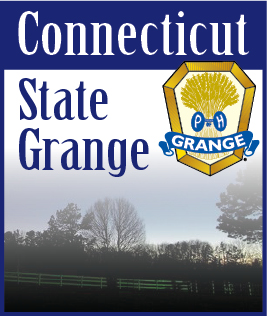| JUNE 13, 2010 -- The deep divide in the U.S. political system won't necessarily be solved by politicians in Washington or Madison, the National Grange president said during a stop in Wisconsin May 25th.
Edward Luttrell, a small-farm operator from Oregon, discussed a range of issues with Wisconsin Grange members May 25 at a meeting at the La Prairie Grange Hall near Janesville.
Luttrell said one of the Grange's long-standing beliefs is that more citizens should be involved and engaged in the political process. Unfortunately, the current "highly charged partisan atmosphere" has people disillusioned with government, Luttrell said.
"As I travel the country, I find that the partisanship has permeated our entire society," Luttrell said. "Everyone talks about how they want the politicians to be nonpartisan, but then they call the other side names. To assume that politicians are going to lead us away from this extreme partisanship I think is foolish, because most politicians don't lead very well, they follow the wind."
Luttrell said he hopes that nonpartisan organizations such as the Grange can encourage people to work together and "argue the issues without the discussion of partisan politics."
The National Grange is the nation's oldest agricultural organization, with units in 2,300 communities in 38 states. Its 200,000 members focus on issues such as economic development, rural broadband, education and legislation designed to assure a strong rural America.
According to the Grange website, the organization was formed following the American Civil War "to unite private citizens in improving the economic and social position of the nation's farm population." The Grange has since expanded to include members from nonfarm rural families and communities.
The Grange is also a fraternal order known as the Order of Patrons of Husbandry.
Wisconsin has a small Grange membership as compared with some states. Duane Scott, Wisconsin Grange president, said there are 275 members in Wisconsin's 11 chapters. Most of the chapters are in southeastern Wisconsin, although there are groups in Appleton, Fond du Lac and Plainfield.
Luttrell said the National Grange is going through a resurgence with membership increasing.
"We've probably started more new Granges in the past three or four years than we'd done for the previous decade," Luttrell said. "From that viewpoint, we're finding it extremely easy to get new members and especially younger people. But at the same time, with the realities of life today, people are busy, and you have to demonstrate value to them.
"The challenge is finding ways to connect with people. The more successful we are at connecting with people, the easier it is to start a Grange."
He said his goal is to have Grange chapters in every state within a few years.
Scott, an administrative captain with the Jefferson County Sheriff's Department, said one of his goals as Wisconsin Grange president is to increase membership and create new chapters.
"We're really trying to revitalize existing Granges and expand our base to people who aren't familiar with what the Grange stands for and what we can do for them," Scott said.
The Grange has been concentrating on rural broadband, Luttrell said. He said Grange leaders believe broadband access is a continuation of the organization's long-standing commitment to improving the country's communications infrastructure.
"We were one of the leading proponents for rural free mail delivery and universal rural telephone service," Luttrell said. "We were also one of the strong advocates for the commercial licensing of television and radio. To us broadband continues that fight."
Luttrell said rural America is lagging behind urban and suburban America in access to high-speed Internet.
"That's completely unacceptable," he said. "By rural America being able to have access to tele-medicine, tele-education and telecommuting, the economic and environmental benefits are great."
Grange leaders have been following the issue and weigh in through their lobbyist when pieces of rural broadband legislation are being considered, Luttrell said.
The best way for broadband access to expand across the country would be for a public/private partnership to take hold, he said.
"We are firm believers that you can't have the government regulating everything," he said. "At the rate the Internet changes, governments don't work that fast. We've found in the past that the best solutions came about when the government gave incentives to private business to meet the needs of the citizens. These kinds of partnerships are far more effective than taking over and telling everyone how to do it."
Farmland protection has been a big issue for the Wisconsin Grange, Scott said.
"It's something our members are seeing, cities gobbling up prime real estate without any real rules or guidelines," he said. "It's one of the things we're hoping to work on and get people involved in."
Scott said the La Prairie Grange Hall was built in 1874 in partnership with the Town of La Prairie. The building has been shared by the Grange and township ever since.
|
